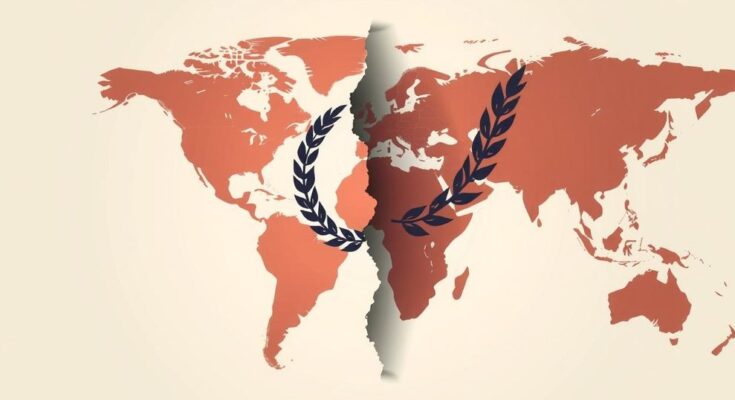Venezuela has condemned Guyana and regional entities over border tensions in the Essequibo region. Defence Minister General Padrino Lopez defends the country’s actions following a maritime incident involving a Venezuelan Coast Guard vessel, while Guyana’s President Ali raises alarms. The U.S. has criticized Venezuela’s aggression, and regional support for Guyana is growing. The situation highlights ongoing geopolitical complexities in the area.
Venezuela has expressed strong condemnation towards Guyana and regional organizations for allegedly exacerbating tensions regarding the ongoing border dispute in the contentious Essequibo region. Despite criticism from Guyana and the international community, Venezuelan Defence Minister General Vladimir Padrino Lopez reaffirmed his country’s stance on recent maritime incidents, emphasizing the validity of the Geneva Agreement as the legal framework governing the dispute.
On March 2, Lopez stated that the Venezuelan Armed Forces (FANB) firmly rejects claims made by Guyana’s President Irfaan Ali regarding a supposed incursion by a Venezuelan Coast Guard vessel into Guyana’s Exclusive Economic Zone (EEZ) on March 1. Lopez asserted that the area in question lacks legal sovereignty for Guyana, as disputes should be resolved under international law.
President Ali voiced concerns over what he described as an incursion by Venezuelan forces, which allegedly posed a threat to the operations of ExxonMobil’s offshore platform, Prosperity FPSO. Media reports, including an audio exchange between the Venezuelan Coast Guard and the FPSO, suggested a Venezuelan claim over the area.
The U.S. State Department condemned the Venezuelan naval actions, labeling them as threats against workers employed by ExxonMobil. Lopez responded by accusing Guyana of unlawful hydrocarbon exploitation, condemning foreign intervention and what he termed imperialistic actions of North American companies.
Lopez criticized some regional organizations for taking biased stances that, in his view, hinder resolution efforts and stoke hostilities. He emphasized the readiness of the FANB to defend national integrity against perceived threats, maintaining a commitment to an anti-imperialist approach.
On January 10, the U.S. government issued a wanted notice for Lopez concerning drug trafficking charges, which included a $15 million bounty for information leading to his arrest. This occurred amidst allegations surrounding the legitimacy of President Maduro’s re-election and the recognition of his government by the U.S.
Internationally, countries and organizations such as Caricom and the Organization of American States (OAS) have expressed their solidarity with Guyana. The acting Prime Minister of Trinidad and Tobago, Stuart Young, reiterated support for Guyana’s sovereignty and the adherence to agreements established in the Argyle accord.
Moreover, Commonwealth Secretary-General Patricia Scotland condemned Venezuela’s actions and praised Guyana for its diplomatic responses to the incident. She underscored the need for adherence to international law and the principles agreed upon during previous Commonwealth meetings, highlighting a collective commitment to uphold Guyana’s sovereignty and territorial integrity.
In summary, Venezuela has escalated its stance against Guyana regarding the maritime border dispute in the Essequibo region, maintaining that it has sovereignty over contested waters. While the international community, including the U.S. and Commonwealth nations, has shown support for Guyana, Venezuela’s defense minister continues to reject these claims and accuses regional organizations of fueling hostility. The situation is complex, with broader implications for international relations and regional stability.
Original Source: newsday.co.tt




